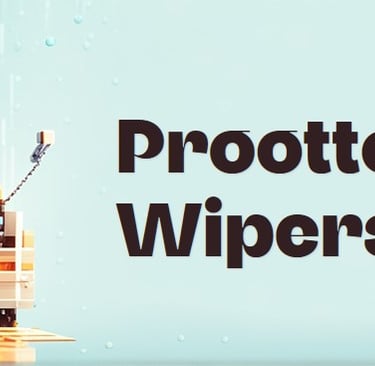Frameless vs Hybrid vs Conventional Wipers – Which is Best?
Understand the difference between frameless, hybrid, and conventional wipers. Compare features, prices, and best use cases to choose the right wiper for your car in India.


Understanding Wiper Blade Types: A Must for Every Car Owner
When it’s pouring rain or a dusty storm blows in, your car’s wiper blades are your first line of defense. But which type suits your vehicle and driving conditions best—frameless, hybrid, or conventional?
Let’s decode the differences and help you make an informed decision.
🧩 What Are the Main Types of Wiper Blades?
1. Conventional Wipers
Structure: Classic metal frame with multiple pressure points
Material: Rubber blade held in a spring-loaded frame
Use Case: Common on older or entry-level vehicles
Pros: Budget-friendly, widely available
Cons: Less aerodynamic, can leave streaks over time
2. Frameless Wipers
Structure: One-piece beam-style rubber design
Material: Silicone or graphite-coated rubber
Use Case: Ideal for modern vehicles and highway driving
Pros: Sleek look, silent operation, better contact with windshield
Cons: Slightly more expensive than conventional
3. Hybrid Wipers
Structure: Combines a rigid frame with aerodynamic housing
Material: Dual-layer rubber with coated finish
Use Case: All-weather performance in cities and rural conditions
Pros: Combines durability with performance
Cons: Can be costlier than other types
🛠️ Performance Comparison: Which Wiper Blade Works Best?
1. Rain Performance:
Frameless > Hybrid > Conventional
2. Dust & Heat Tolerance:
Hybrid > Frameless > Conventional
3. Aesthetics / Premium Feel:
Frameless = Hybrid > Conventional
4. Lifespan:
Hybrid (12–18 months)
Frameless (10–12 months)
Conventional (6–10 months)
🛒 Wiper Blade Type Buying Guide (India)
1. Conventional Wipers
Price Range: ₹300–₹600
Durability: Low to Moderate
Best for: Light rain and short-term use
Vehicle Type: Entry-level cars and older models
Look & Finish: Basic appearance
2. Frameless Wipers
Price Range: ₹500–₹900
Durability: Moderate
Best for: Heavy rainfall and highway speeds
Vehicle Type: Sedans and SUVs
Look & Finish: Sleek and premium
3. Hybrid Wipers
Price Range: ₹700–₹1,200
Durability: High
Best for: All-weather conditions (rain, dust, sun)
Vehicle Type: Premium vehicles or any car needing reliable year-round performance
Look & Finish: Sleek with strong frame and modern styling
❓ Common Questions Answered
Q1. Which wiper blade is best for monsoon?
A: Frameless or hybrid wipers are ideal. They offer better grip and water dispersion during heavy rainfall.
Q2. Are hybrid wipers suitable for Indian summers?
A: Yes. Hybrid wipers withstand heat and dust better due to their structured build and rubber quality.
Q3. Can I upgrade from conventional to frameless wipers?
A: Absolutely. Most frameless wipers come with universal adapters and are compatible with most Indian cars.
Q4. Why are frameless wipers more expensive?
A: Frameless wipers offer better aerodynamics, noise reduction, and premium materials which increase their cost but enhance performance.
Q5. Which wiper type lasts the longest?
A: Hybrid wipers tend to have the longest lifespan due to their rigid internal structure and coating.
💡 Prootto Recommendation
For Indian conditions, frameless wipers are a solid choice for daily urban driving and monsoons. If you want something long-lasting with high performance across climates, go for hybrid wipers. Conventional wipers work well for short-term or backup use.
And remember—Prootto’s wiper blade range is engineered specifically for Indian roads and weather.
🛒 Explore our collection: Prootto Windscreen Wipers
Subscribe to our newsletter
Enjoy exclusive special deals available only to our subscribers.
